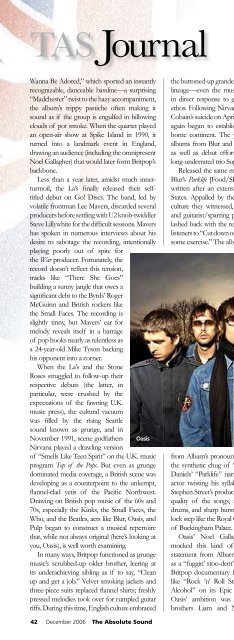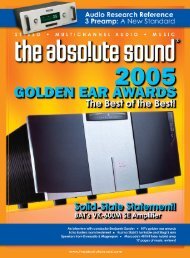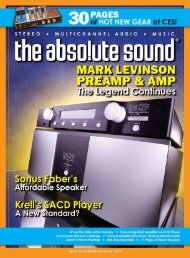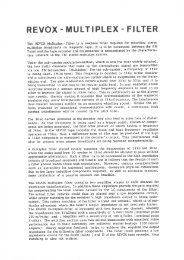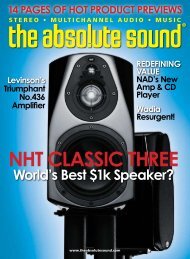Create successful ePaper yourself
Turn your PDF publications into a flip-book with our unique Google optimized e-Paper software.
TAS Journal<br />
Basic Repertoire: Britpop<br />
Wanna Be Adored,” which sported an instantly<br />
recognizable, danceable bassline—a surprising<br />
“Madchester” twist to the hazy accompaniment,<br />
the album’s trippy pastiche often making it<br />
sound as if the group is engulfed in billowing<br />
clouds of pot smoke. When the quartet played<br />
an open-air show at Spike Island in 1990, it<br />
turned into a landmark event in England,<br />
drawing an audience (including the omnipresent<br />
Noel Gallagher) that would later form Britpop’s<br />
backbone.<br />
Less than a year later, amidst much innerturmoil,<br />
the La’s finally released their selftitled<br />
debut on Go! Discs. The band, led by<br />
volatile frontman Lee Mavers, discarded several<br />
producers before settling with U2 knob-twiddler<br />
Steve Lillywhite for the difficult sessions. Mavers<br />
has spoken in numerous interviews about his<br />
desire to sabotage the recording, intentionally<br />
playing poorly out of spite for<br />
the War producer. Fortunately, the<br />
record doesn’t reflect this tension,<br />
tracks like “There She Goes”<br />
building a sunny jangle that owes a<br />
significant debt to the Byrds’ Roger<br />
McGuinn and British rockers like<br />
the Small Faces. The recording is<br />
slightly tinny, but Mavers’ ear for<br />
melody reveals itself in a barrage<br />
of pop hooks nearly as relentless as<br />
a 24-year-old Mike Tyson backing<br />
his opponent into a corner.<br />
When the La’s and the Stone<br />
Roses struggled to follow-up their<br />
respective debuts (the latter, in<br />
particular, were crushed by the<br />
expectations of the fawning U.K.<br />
music press), the cultural vacuum<br />
was filled by the rising Seattle<br />
sound known as grunge, and in<br />
November 1991, scene godfathers<br />
Nirvana played a drawling version<br />
Oasis<br />
of “Smells Like Teen Spirit” on the U.K. music<br />
program Top of the Pops. But even as grunge<br />
dominated media coverage, a British scene was<br />
developing as a counterpoint to the unkempt,<br />
flannel-clad yetis of the Pacific Northwest.<br />
Drawing on British pop music of the 60s and<br />
70s, especially the Kinks, the Small Faces, the<br />
Who, and the Beatles, acts like Blur, Oasis, and<br />
Pulp began to construct a musical repertoire<br />
that, while not always original (here’s looking at<br />
you, Oasis), is well worth examining.<br />
In many ways, Britpop functioned as grunge<br />
music’s scrubbed-up older brother, leering at<br />
its underachieving sibling as if to say, “Clean<br />
up and get a job.” Velvet smoking jackets and<br />
three-piece suits replaced flannel shirts; freshly<br />
pressed melodies took over for rumpled guitar<br />
riffs. During this time, English culture embraced<br />
42 December 2006 The Absolute Sound<br />
the buttoned-up grandeur of its “Great Britain”<br />
lineage—even the music being recorded was<br />
in direct response to grunge’s couch-crashing<br />
ethos. Following Nirvana singer/guitarist Kurt<br />
Cobain’s suicide on April 5, 1994, British rockers<br />
again began to establish dominance on their<br />
home continent. The year saw inspired third<br />
albums from Blur and Manic Street Preachers<br />
as well as debut efforts from Oasis and the<br />
long-underrated trio Supergrass.<br />
Released the same month as Cobain’s death,<br />
Blur’s Parklife [Food/SBK] is a cheeky album<br />
written after an extensive tour of the United<br />
States. Appalled by the plastic, shopping-mall<br />
culture they witnessed, singer Damon Albarn<br />
and guitarist/sparring partner Graham Coxon<br />
lashed back with the record’s title track, urging<br />
listeners to “Cut down on your park life, mate, get<br />
some exercise.” The album is ostensibly British,<br />
from Albarn’s pronounced Cockney accent on<br />
the synthetic chug of “Girls & Boys” to Phil<br />
Daniels’ “Parklife” narration, the Quadrophenia<br />
actor twisting his syllables with obvious glee.<br />
Stephen Street’s production highlights the neon<br />
quality of the songs, string sections, punchy<br />
drums, and sharp bursts of guitar marching in<br />
lock step like the Royal Guard parading in front<br />
of Buckingham Palace.<br />
Oasis’ Noel Gallagher has consistently<br />
mocked this kind of high-concept, artistic<br />
statement from Albarn, dismissing the singer<br />
as a “fuggin’ stoo-dent” in John Dower’s 2003<br />
Britpop documentary Live Forever. With songs<br />
like “Rock ’n’ Roll Star” and “Cigarettes &<br />
Alcohol” on its Epic debut Definitely Maybe,<br />
Oasis’ ambition was clear from the start,<br />
brothers Liam and Noel Gallagher firmly<br />
believing they were stars long before they<br />
recorded a single note. Liberally borrowing<br />
from everyone from the Beatles to the Rolling<br />
Stones (“Shakermaker” even echoes the New<br />
Seekers’ “I’d Like To Teach the World To<br />
Sing”), Oasis appeared to embrace America’s<br />
“bigger is better” philosophy—bigger guitars,<br />
bigger personalities, and bigger choruses. The<br />
production highlights this rawk element, guitars<br />
buzzing and gnashing like a timber mill as Liam<br />
Gallagher rasps, “It’s just rock ’n’ roll.” But a<br />
mix of the Gallagher brothers’ refreshingly<br />
brash attitudes as well as undeniable tunes like<br />
“Supersonic” and “Live Forever” gave credence<br />
to the group’s inflated self-worth.<br />
Breaking through with the same tenacity and<br />
a tenth the ego, Supergrass released I Should Coco<br />
[Capitol], a breakneck, mash-up of an album<br />
that finds the trio, barely out of its teens, tearing<br />
at its instruments with the manic<br />
energy of a speed freak searching<br />
out another hit. Sam Williams’<br />
production is justifiably sloppy,<br />
capturing the sound of three<br />
friends recording in a basement<br />
with too much beer and not<br />
enough time. But the resulting<br />
album is a thrill-a-minute joyride,<br />
whether the threesome is on the<br />
run from the cops (“Caught By<br />
the Fuzz,” which could also refer<br />
to the band’s recording technique)<br />
or off chasing the wrong girls<br />
(“She’s So Loose”).<br />
Often lumped in with the<br />
Britpop movement, though its<br />
roots aren’t British (the band hales<br />
from Blackwood, Wales) and<br />
music not overtly poppy, Manic<br />
Street Preachers’ The Holy Bible<br />
[Epic] is one of the direst records<br />
to emerge from the scene. The<br />
lyrics, some of the last penned by guitarist Richey<br />
James prior to his unsolved disappearance<br />
in 1995, touch on anorexia (the devastating<br />
“4st 7 lb”), sexual confusion (“Yes”), and an<br />
overwhelming desire to change, even at the high<br />
cost of death (“Die in the Summertime”). Singer<br />
James Dean Bradfield imbues the songs with<br />
the necessary desperation, his vocals soaring on<br />
“Mausoleum” as guitars scratch and claw like<br />
demons pulling him towards hell. Sonically, the<br />
album is not as dour as its lyrics might suggest, a<br />
wide soundstage leaving room for the cavalcade<br />
of razor-sharp guitar riffs. Especially impressive<br />
is “The Intense Humming of Evil,” a rumbling<br />
bassline echoing the title as Bradfield tosses and<br />
turns with night terrors, the song smoldering<br />
like Mephistopheles brooding upon his dark<br />
throne.


